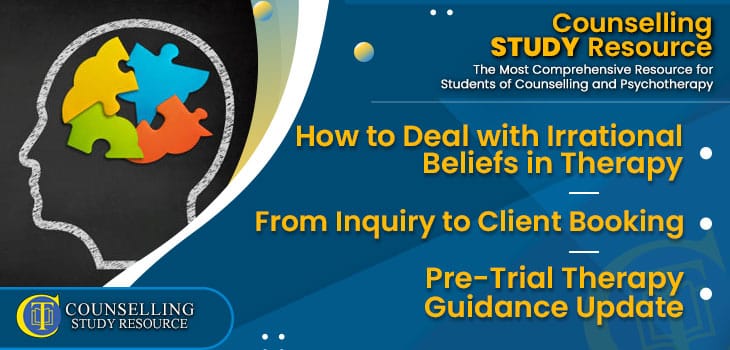242 - How to Deal with Irrational Beliefs in Therapy
From Inquiry to Client Booking – Pre-Trial Therapy Guidance Update
In Episode 242 of the Counselling Tutor Podcast, your hosts Rory Lees-Oakes and Ken Kelly are back with this week’s three topics:
- Firstly in ‘Theory in Practice’ we’ll be looking at irrational beliefs.
- Then in ‘Practice Partner’, Rory and Ken discuss how we go from an inquiry to a client booking.
- And lastly in ‘Practice Matters’, Rory speaks with Erene Hadjiioannou about the changes made to pre-trial therapy guidance.
How to Deal with Irrational Beliefs in Therapy [starts at 03:37 mins]
This segment of the Counselling Tutor Podcast is sponsored by
WebHealer.net
- WebHealer are the go-to provider of websites for private practitioners in the UK.
- Established over 20 years, WebHealer offers a non-technical and fully supported service to help therapists grow their private practice.
- Just one customer from your website each year pays for their service.
Go to WebHealer.net and use coupon CT100 for £100 off their "Do it for me" service.
Irrational beliefs are something that everyone experiences, knowing how to challenge these both within the client and within ourselves is important.
The main points of this discussion include:
- Irrational belief falls under cognitive behavior therapy.
- It’s important to help the client identify their irrational beliefs and check them against reality.
- ABCD:
- Actuating event (the event that introduces the irrational belief)
- Belief (the irrational belief itself)
- Consequence (the affect this belief has e.g. lowered confidence)
- Dispute (challenging the irrational belief)
- When a client brings up an irrational belief in the therapy room you may want to gently challenge this. E.g. if a client says ‘I’m so stupid’, you could respond to this with ‘I hear what you're saying about yourself, and I know that’s how you feel about yourself, but that’s not how I experience you.’
- For the client, these beliefs are their truths.
- You can challenge your own irrational beliefs – do some self-reflection and think if there is anything that is holding you back.
- Challenge these by building your skills – nobody is good at anything until they learn and practice it.
Theory to Practice is sponsored by
Counselling Skills Academy
Learn counselling techniques by seeing counselling skills used in real sessions by qualified therapists.
Real sessions – real-life presentations – real skills.
From Inquiry to Client Booking [starts at 22:00 mins]
When it comes to getting clients for your practice, communication is key. In this section, Rory and Ken look at some important things to consider when making that first contact with a client:
- Regularly check your emails and voicemails – this includes your spam folder.
- Your possible client is likely quite vulnerable at the time they're reaching out to you – if they do not receive a response from you, this won’t help them feel any better.
- Your first contact with a client is important, it will create an impression of you.
- Getting back to the client as quickly as possible (preferably within 24hrs) is important.
- Come back to the client with some information about yourself and maybe offer a free half hour in person meeting so that you can check that your competence level is a good match for this client.
- If someone has not left a message – don’t phone them back. The client may be at work, or with an abusive partner, and ringing them back may do more harm than good.
- A good way to deal with this may be to set up an answer phone that asks the client to leave a time when you could call them back.
- Setting up an in-person meeting will be very useful. The therapeutic relationship is so important to the outcome of the counselling.
- Remember this will NOT be a 30 minute counselling session – that would be unethical as there is no contract between you or the client, and this may leave the client feeling exposed.
- This session is best kept for covering fees and availability and allowing the client to ask any questions they might have.
- It’s a good idea to give the client an estimate of how many sessions you may thing they’ll need with you – this allows the client to fully consider the cost.
Get on-demand Certified CPD that is implementable in your practice
Counsellor CPD Library
- Over 150 hours of on-demand CPD lectures to help you stay current with your CPD ethical requirements
- Support, and be supported, by thousands of other counsellors as a member of the exclusive online community.
- Access your learning anytime you want ... anywhere you choose ... using any device type — desktop or mobile.

Pre-Trial Therapy Guidance Update [starts at 46:50 mins]
In this week’s ‘Practice Matters’, Rory speaks again to Erene Hadjiioannou about the changes made to the pre-trial therapy guidance (specific to the UK).
The main points of this discussion are:
- Clients can now speak freely – regardless of whether or not they are going through with the criminal justice process at the time.
- What remains, and is important for therapists, is that there is the possibility of a request for your clinical notes as third party evidence.
- However, notes should only be requested under a reasonable line of inquiry rather than speculatively.
- You can refuse the request for notes (if justified) – unless a judge issues a court order for your notes, then there is no option to refuse.
- It is important that you make the client aware of what choices they might have during the process – it is always the client’s choice to seek therapy.
- Discuss the reality of what might happen, and practice transparency with the client.
- Whereas you used to have the option to create and release a summary report instead of your full notes, this is no longer an option. Your notes will now have to be shown as they are.
The National Counselling Society is proud to sponsor Practice Matters.
NCS are really excited to have launched their Children and Young People Therapist Register for counsellors working with the younger age group.
Free Handout Download
Cognitive Interventions
